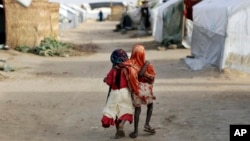U.N. aid agencies said they are starved for funding and barely able to continue life-saving assistance to millions of victims of war in the Central African Republic, both inside and outside the country. The agencies warned that C.A.R. is at risk of becoming the world’s largest forgotten humanitarian crisis and urged donors to respond generously to their renewed appeals for humanitarian aid.
Nearly 900,000 people from the Central African Republic have been forcibly displaced from their homes since fighting erupted there in December 2013. Slightly more than half fled as refugees to neighboring Cameroon, Chad, and the Democratic Republic of the Congo.
About 436,000, are displaced within C.A.R. More than two million other people in the country also are in need of humanitarian assistance. But the ability of aid agencies to help them is drying up.
The United Nations is renewing two separate appeals that were launched earlier this year.
The Organization for the Coordination for Humanitarian Affairs (OCHA) has received only 14 percent of its $613 million appeal and donors have provided only nine percent of the $331 million the U.N. refugee agency needs to carry out its humanitarian operations.
OCHA Senior Humanitarian Coordinator for the C.A.R., Claire Bourgeois, said she visited two villages last week in the north, where 10,000 people had just returned to the homes they had fled.
She described their condition as pitiful. “I never saw people with so poor clothes on them," she said.
"They try to rebuild their house. They have no straw to put on the roof," she added. "They try to find food ... absolutely no health care at the moment. The school was burned, but the people came back out of the bush because they think there is some peace coming back, some security that now are in place.”
Next week, nearly 600 participants representing most of the armed groups, the government, political parties, internally displaced people, refugees and others will attend the Bangui Forum on National Reconciliation. This meeting is designed to address the political and security issues at the heart of the crisis.
Bourgeois told VOA the outlook is positive. “Maybe not all expectations will be met, but it is a process," she said.
"It is one step forward in the process that certainly will reach some positive conclusion and maybe some disappointment on the other one," she ventured. "But, we should not stop ... I have to say that so far, yes, I am optimistic that it will contribute to the political process in finding a solution for C.A.R.”
But U.N. agencies said they cannot wait for the political process to reach its end. They said they need money to provide people with seeds, so they can plant their crops. They need money to feed, shelter, and educate hundreds of thousands of Central Africans who are displaced or living precariously in their villages.




